
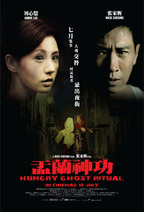
Yu Lan Sun Gung
Hong Kong 2014
Genre:
Horror
Director:
Nick Cheung
Cast:
Nick Cheung
Annie Liu
Lam Wai
Carrie Ng
Cathryn Lee
Eric Chen
Karena Teo

Hungry Ghost Ritual
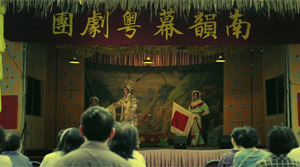
Story: Zong Hua (Nick Cheung) returns to his family after his company in China has gone bankrupt. His father Xiaotian (Lam Wai) is head of a
traditional opera troupe and very happy that his son is finally back. However, Zong Hua's half-sister Jing Jing (Cathryn Lee) isn't as enthusiastic about this.
Zong Hua's bankruptcy has also lead to his marriage falling apart and so he now needs to reorientate himself in life. But when his father ends up in
hospital he needs to take care of the next opera performances. Yet, he is everything but familiar with the traditions and several rituals involved to
appease ghosts. Because of this the team doesn't accept him as one of them, even though Xiu Yin (Annie Liu) tries to act as a mediator. She teaches
Zong Hua the basics, but his work is constantly sabotaged and sometimes he even barely escapes with his life. Only slowly Zong Hua realizes that it's
not the opera troupe that is behind the acts of sabotage, but ghosts. At first, he can't believe in something like this, but when he installs CCTVs around
the place he has proof that ghosts actually exist and that some of the team members are even possessed by them.

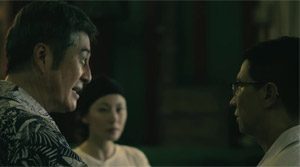
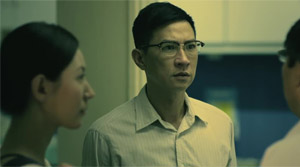

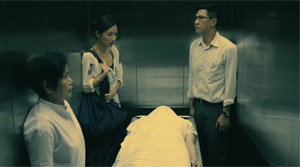
Review: No one will claim that China has distinguished itself with extremely well made horror movies the past few years. Consequently, there
actually is no reason to pay the genre a visit. However, I was curious to see how well Nick Cheung would do in his directing debut. Since I didn't really
have high expectations concerning his skills "Hungry Ghost Ritual" wasn't that much of a disappointment, although it simply isn't a well done horror flick.
The main problem lies in the half-baked story and the at best roughly outlined characters. What's positive to note is that the movie deals with death cult
and ancestor worship and manages to arouse interest on this level. Then again, the story remains too much at the surface in this respect as well.
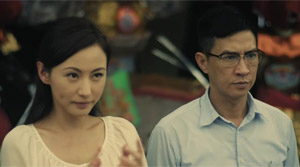
Traditions and superstition are an important aspect in the horror flick's story, which is why Hong Kongnese (or those of any other culture with similar
rituals) will find it easier to gain access to the film than Westerners. An opera performance that is solely for the dead while the rest of the troupe is
sitting in the audience facing away from the stage? There are quite a few things that western cultures may consider way too superstitious, but when even
Zong Hua, who has no strong roots in traditions, briefly bows in apology for having knocked over a bowl with some offerings, one thing should become clear:
Superstition and rituals aren't easily discarded. In fact, this makes the movie very Chinese which is why it manages to fascinate the viewer on a cultural
level while a Western audience should be all too familiar with the horror elements. Moreover, there are enough jump scares to prevent boredom.

Yet, those creepy moments are extremely generic. How many times did we already see protagonists finding themselves in a hospital elevator with a dead body
transported as well? Guess what might happen next? Apart from that there are numerous scenes in which we see ghosts on a screen. Guess again,
will there be your mandatory ghost coming from the lower edge of your screen and suddenly look at you? It should be pretty obvious, where I'm going with this.
The wheel isn't reinvented here and the only thing interesting concerning the horror moments is that the protagonists are possessed by ghosts every now and then.
The atmosphere is very dense, particularly in the horror scenes, but all in all "Hungry Ghost Ritual" remains too cold. This is also the fault of the
characters that are developed poorly.
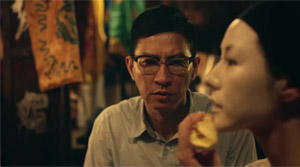
Zong Hua isn't accepted by the team, but this isn't made use of in a profitable way. Xiu Yin is supposed to be a love interest, but this is presented way
too cold and also isn't pursued any further. Then, there are also hints at Zong Hua's ex-wife and his life away from opera during the last decade. What those
elements are meant to mean in the big picture remains unanswered, though. Actually, a lot of things in the story remain only hinted at and you will look for
explanations to no avail, even leading to the risk of not completely understanding the ending. A problem in this respect is also that you can easily overlook
the fact that the story around the ageing opera singer, which is told parallely, is in fact taking place in the past. This is hard to make out without the
help of any visual means. Even the cinematography or color filters aren't used to enlightening us.

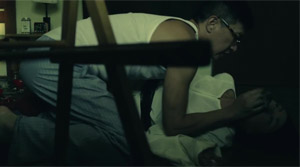
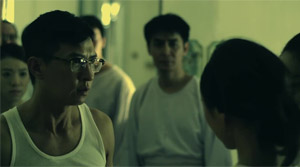

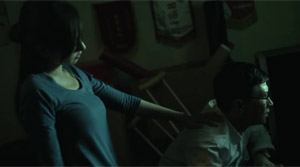
Besides an unnecessarily muddled screenplay and the lack of a connection between the main story and subplot all throughout the screenplay doesn't offer any good dialogue or smart clues that maybe would allow you to puzzle the pieces together on your own. Annie Liu ("Exodus", "Floating City") has her moments, but her character remains without a soul. Nick Cheung ("Helios", "That Demon Within") delivers a restrained performance, but his character lacks any real depth which is why his acting simply remains shallow. At the bottom line it needs to be stressed that as an actor Cheung can be very convincing in many roles which can't be said about him as a director, though, at least concerning "Hungry Ghost Ritual". The cultural subtleties are interesting, but that aside you only get a rather short genre entry with its running time of merely 82 minutes that will only allow hardcore horror fans to excuse the many flaws.

Disclaimer










